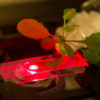A major breakthrough in artificial photosynthesis has been achieved with the development of a system that can capture carbon dioxide emissions and convert them into valuable chemical products, including biodegradable plastics, pharmaceutical drugs and even liquid fuels. Developed by scientists from the Lawrence Berkeley National Laboratory and the University of California Berkeley, the system uses […]









